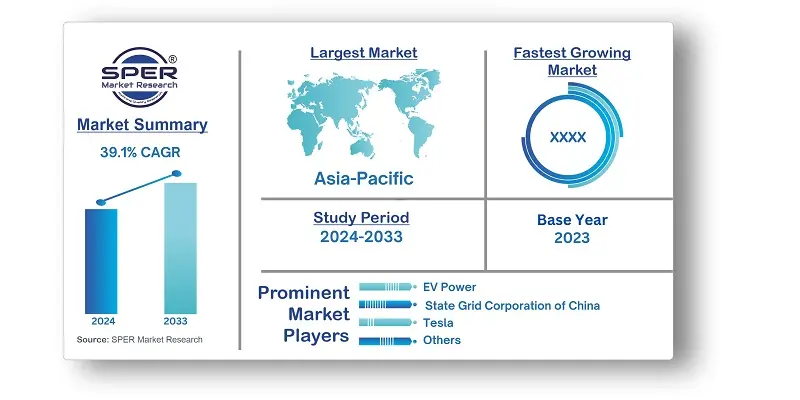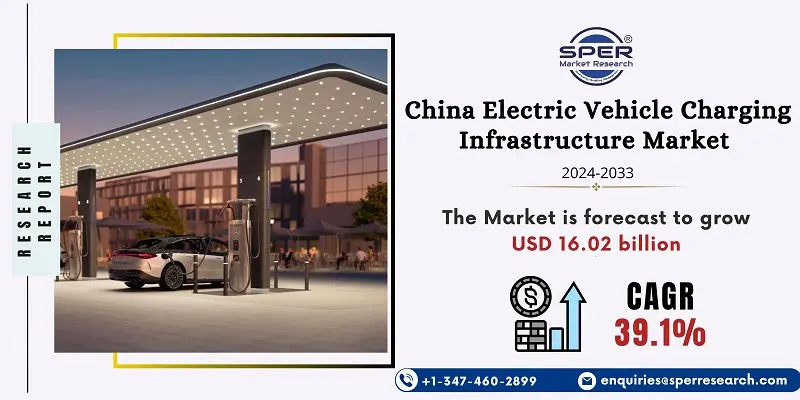
China Electric Vehicle Charging Infrastructure Market Trends, Share, Size and Future Outlook
China Electric Vehicle Charging Infrastructure Market Growth, Size, Trends Analysis- By Charging Station Type, By Vehicle Type, By User Application- Regional Outlook, Competitive Strategies and Segment Forecast to 2033
| Published: Nov-2024 | Report ID: AMIN24232 | Pages: 1 - 108 | Formats*: |
| Category : Automotive & Transportation | |||
- In September 2023, PetroChina, a well-known oil and gas corporation with headquarters in China, revealed that it has acquired Potevio New Energy Co. Ltd., an EV charging company. Its goal is to make its brand known throughout China's EV charging market. By the end of 2021, Potevio was expected to have 50,000 charging stations spread across more than 50 Chinese cities.
- In June 2023, The Chinese government asserted that it is committed to increasing the number of new energy vehicle (NEV) charging stations on the nation's roadways and reported that 18,590 charging stations had been installed nationwide. Authorities added that they had identified 27,000 parking spaces that will be used exclusively for the installation of EV charging stations nationwide.


| Report Metric | Details |
| Market size available for years | 2020-2033 |
| Base year considered | 2023 |
| Forecast period | 2024-2033 |
| Segments covered | By Charging Station Type, By Vehicle Type, By User Application |
| Regions covered | Eastern Region, Western Region, Northern Region, Southern Region |
| Companies Covered | EV Power, Evking, Hooenergy, ShenZhen Carenergy Net, Southern Power Grid, Starcharge, State Grid Corporation of China, Tesla, TGood, Wancheng Wanchong, YKC, Others. |
- Electric Vehicle Owners
- Commercial Fleets
- Charging Station Operators
- Municipal Governments
- Utility Companies
- Real Estate Developers
- Automotive Manufacturers
- Environmental Organizations
- Policy Makers
| By Charging Station Type: | |
| By Vehicle Type: | |
| By User Application: |
- China Electric Vehicle Charging Infrastructure Market Size (FY’2024-FY’2033)
- Overview of China Electric Vehicle Charging Infrastructure Market
- Segmentation of China Electric Vehicle Charging Infrastructure Market By Charging Station Type (AC Charging Station, DC Charging Station)
- Segmentation of China Electric Vehicle Charging Infrastructure Market By Vehicle Type (Passenger Vehicles, Commercial Vehicles)
- Segmentation of China Electric Vehicle Charging Infrastructure Market By User Application (Private Infrastructure, Public Infrastructure)
- Expansion Analysis of China Electric Vehicle Charging Infrastructure Market
- Problems and Obstacles in China Electric Vehicle Charging Infrastructure Market
- Competitive Landscape in the China Electric Vehicle Charging Infrastructure Market
- Impact of COVID-19 and Demonetization on China Electric Vehicle Charging Infrastructure Market
- Details on Current Investment in China Electric Vehicle Charging Infrastructure Market
- Competitive Analysis of China Electric Vehicle Charging Infrastructure Market
- Prominent Players in the China Electric Vehicle Charging Infrastructure Market
- SWOT Analysis of China Electric Vehicle Charging Infrastructure Market
- China Electric Vehicle Charging Infrastructure Market Future Outlook and Projections (FY’2024-FY’2033)
- Recommendations from Analyst
1.1. Scope of the report1.2. Market segment analysis
2.1. Research data source2.1.1. Secondary Data2.1.2. Primary Data2.1.3. SPER’s internal database2.1.4. Premium insight from KOL’s2.2. Market size estimation2.2.1. Top-down and Bottom-up approach2.3. Data triangulation
4.1. Driver, Restraint, Opportunity and Challenges analysis4.1.1. Drivers4.1.2. Restraints4.1.3. Opportunities4.1.4. Challenges4.2. COVID-19 Impacts of the China Electric Vehicle Charging Infrastructure Market
5.1. SWOT Analysis5.1.1. Strengths5.1.2. Weaknesses5.1.3. Opportunities5.1.4. Threats5.2. PESTEL Analysis5.2.1. Political Landscape5.2.2. Economic Landscape5.2.3. Social Landscape5.2.4. Technological Landscape5.2.5. Environmental Landscape5.2.6. Legal Landscape5.3. PORTER’s Five Forces5.3.1. Bargaining power of suppliers5.3.2. Bargaining power of buyers5.3.3. Threat of Substitute5.3.4. Threat of new entrant5.3.5. Competitive rivalry5.4. Heat Map Analysis
6.1. China Electric Vehicle Charging Infrastructure Market Manufacturing Base Distribution, Sales Area, Product Type6.2. Mergers & Acquisitions, Partnerships, Product Launch, and Collaboration in China Electric Vehicle Charging Infrastructure Market
7.1. China Electric Vehicle Charging Infrastructure Market Size, Share and Forecast, By Charging Station Type, 2020-20267.2. China Electric Vehicle Charging Infrastructure Market Size, Share and Forecast, By Charging Station Type, 2027-20337.3. AC Charging Station7.4. DC Charging Station
8.1. China Electric Vehicle Charging Infrastructure Market Size, Share and Forecast, By Vehicle Type, 2020-20268.2. China Electric Vehicle Charging Infrastructure Market Size, Share and Forecast, By Vehicle Type, 2027-20338.3. Passenger Vehicles8.4. Commercial Vehicles
9.1. China Electric Vehicle Charging Infrastructure Market Size, Share and Forecast, By User Application, 2020-20269.2. China Electric Vehicle Charging Infrastructure Market Size, Share and Forecast, By User Application, 2027-20339.3. Private Infrastructure9.4. Public Infrastructure
10.1. China Electric Vehicle Charging Infrastructure Market Size and Market Share
11.1. China Electric Vehicle Charging Infrastructure Market Size and Market Share By Region (2020-2026)11.2. China Electric Vehicle Charging Infrastructure Market Size and Market Share By Region (2027-2033)11.3. Eastern Region11.4. Western Region11.5. Northern Region11.6. Southern Region
12.1. EV Power12.1.1. Company details12.1.2. Financial outlook12.1.3. Product summary12.1.4. Recent developments12.2. Evking12.2.1. Company details12.2.2. Financial outlook12.2.3. Product summary12.2.4. Recent developments12.3. Hooenergy12.3.1. Company details12.3.2. Financial outlook12.3.3. Product summary12.3.4. Recent developments12.4. ShenZhen Carenergy Net12.4.1. Company details12.4.2. Financial outlook12.4.3. Product summary12.4.4. Recent developments12.5. Southern Power Grid12.5.1. Company details12.5.2. Financial outlook12.5.3. Product summary12.5.4. Recent developments12.6. Starcharge12.6.1. Company details12.6.2. Financial outlook12.6.3. Product summary12.6.4. Recent developments12.7. State Grid Corporation of China12.7.1. Company details12.7.2. Financial outlook12.7.3. Product summary12.7.4. Recent developments12.8. TELD12.8.1. Company details12.8.2. Financial outlook12.8.3. Product summary12.8.4. Recent developments12.9. TGood12.9.1. Company details12.9.2. Financial outlook12.9.3. Product summary12.9.4. Recent developments12.10. Wancheng Wanchong12.10.1. Company details12.10.2. Financial outlook12.10.3. Product summary12.10.4. Recent developments12.11. YKC12.11.1. Company details12.11.2. Financial outlook12.11.3. Product summary12.11.4. Recent developments12.12. Others
SPER Market Research’s methodology uses great emphasis on primary research to ensure that the market intelligence insights are up to date, reliable and accurate. Primary interviews are done with players involved in each phase of a supply chain to analyze the market forecasting. The secondary research method is used to help you fully understand how the future markets and the spending patterns look likes.
The report is based on in-depth qualitative and quantitative analysis of the Product Market. The quantitative analysis involves the application of various projection and sampling techniques. The qualitative analysis involves primary interviews, surveys, and vendor briefings. The data gathered as a result of these processes are validated through experts opinion. Our research methodology entails an ideal mixture of primary and secondary initiatives.



Frequently Asked Questions About This Report
PLACE AN ORDER
Year End Discount
Sample Report
Pre-Purchase Inquiry
NEED CUSTOMIZATION?
Request CustomizationCALL OR EMAIL US
100% Secure Payment






Related Reports
Our Global Clients
Our data-driven insights have influenced the strategy of 200+ reputed companies across the globe.




















